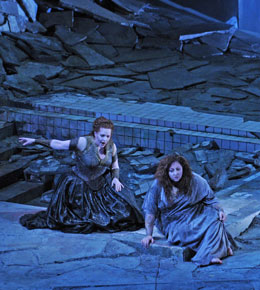
“Elektra” seems a strange choice to open the season at Lyric Opera of Chicago.
No arias, no beautiful costumes, no comic relief, just the intense suffering of this title character from the ancient Greek tragedy by Sophocles. Yet the company’s new production of Richard Strauss’s powerful 90-minute theater piece proves a stunning success.
Opening night belonged to two American sopranos, Elektra, sung with fury and passion by Christine Goerke in her Lyric debut, and Elektra’s sister Chrysothemis, sympathetically portrayed by Ryan Opera Center alumna Emily Magee. The siblings are polar opposites. Elektra is obsessed with vengeance over the murder of her father King Agamemnon by her mother Queen Klyamnestra and her young lover, while Chrysothemis longs to forget the past and claim a woman’s life with children to love and nurture.
Is Elektra mad? She seems so as she goes about the nightly ritual of reenacting her father’s gruesome murder. And Goerke plays her like a wild cat, slinking along the wall surrounding the dreary palace. But when she begs her dead father to appear to her, she is lyrical and heart-breaking.
Her voice flows like molten gold, burning her very soul and repeatedly filling the vast Civic Opera House sans amplification. It is as strong and exciting at the final curtain as it is when she sings her first notes.
Magee, whose character is suffering as well, is likewise a knock-out singer, on stage nearly as much as Elektra. To this duo of tormented women is added the killer Queen, portrayed by the excellent American mezzo Jill Grove, whose nightmares are fueled by her foul deed. A grotesque parade of attendants and courtiers surround her.
Men are marginal in this wrenching tale. The father is dead, his son Orest, ably sung by Illinois-born bass-baritone Alan Held, doesn’t appear until near the end of the story. His reunion with his sister Elektra is one of the opera’s few tender moments.
The set, designed by John Macfarlane, is the exterior of a ruined castle, which looks as if it had been bombed. Surrounded by stones and rubble, it bears the scars of the crime committed in its courtyard. Jennifer Tipton’s artful lighting casts several terrifying shadows. There could have been more of them.
There also could have been more dynamic staging. Most of the time, director Sir David McVicar plants Elektra in the center of the stage, where she waves her arms and holds her head in mental agony. Only when with her sister arrives does she move, and then just to the front of the stage, where they sit and sing. Lyric’s enormous space could have been used to better advantage.
But the searing music by Richard Strauss is the sustaining force throughout this production. Under the baton of Lyric’s music director Sir Andrew Davis, the Lyric Orchestra deftly delivers the score’s jagged edges, chilling shrieks and rare Romantic sweeps. As deliberately as any Hitchcock film score, the music tells us what to feel, when to fear, when to pause for a happy memory and when to despair, as this tragedy draws to its inevitably dark conclusion.
“Elektra” continues at the Civic Opera House, 20 N. Wacker Drive, Chicago at 7:30 p.m. Oct. 10, 13, 19, 22 and 30 and at 2 p.m. Oct. 26. For tickets, call 312-332-2244 or visit www.lyricopera.org.
